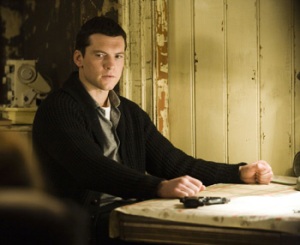Originally Posted September 12th, 2010
Audiences are trained to be sceptical; you’re always taking a risk with the $11 you fork over for a ticket and it’s a mentality that makes some films easier to diagnose than appreciate, as one major flaw can almost always overshadow present successes. As crippling defects go, The Debt has a big one, in the form of a major identity crisis. It's not one movie so much as it is three or four smaller ones of varying tone and quality stitched together, smothering those portions of the movie that, had they been expanded, would have made for a more interesting experience. Things start out promising enough; we're introduced to three Mossad agents in the cargo hold of a plane arriving in Israel. It's 1966 and their mission was to kill or capture a Nazi war criminal hiding in East Germany so that he may stand trial for his actions. You get an idea of how things went down when it's just the agents who are leaving the plane. Rachel Singer is given credit for killing the target, a man named Dieter Vogel, whose experiments on imprisoned Jews during WWII made him known as “the surgeon of Birkenau”.
Jumping ahead to 1997, a now retired Rachel (Mirren) is giving a reading about the event from a new book written by her daughter. The father, Stefan (Wilkinson), was with Rachel in Germany. From the way the retired spies look at each other, it's apparent they share a history that their daughter is not privy to. The publication of the book coincides with rumours of new information coming out about the mission, the same day that David, the third team member, has died. It's an effective opening, full of shadows and wan looking faces, everything you'd want out of a political thriller. We then return back to '66, where a younger Rachel (Chastain) crosses over into East Germany to rendezvous with her new partners. It's her first field assignment and the trio meticulously prepare for the difficult task of getting into West Germany with the doctor in tow. It's exciting stuff early on, with plenty of clandestine handoffs and sparring matches, and one nerve-wracking escape attempt that has all the elements of good spy fiction coming together nicely.

Unfortunately, as they so often do, the plan goes awry, so it’s not long before the agents have the target in their possession, but no way of getting him out of Germany. The introduction of Vogel is first-rate stuff, with Rachel doing recon by posing as one of his patients, the prospect of being at your most vulnerable when around a mass murderer providing some very tense moments, but once Vogel is confined to a dingy safe house, things start to fall apart for both the mission and the film. Thriller as a genre is so broad that it's usually paired with other elements, which is why the in the early goings The Debt leans on political elements and its period aesthetics. But once we have our villain front and centre, director John Madden seems to think he's too juicy to keep gagged all film, and it forces The Debt to ditch its cloak and dagger elements in favour of a slower, more psychological approach that hamstrings the narrative momentum.
For trained operatives, the Mossad bunch don't seem to remember that a talking hostage is bad for team morale, giving Vogel ample opportunity to needle and undermine the trio. While actor Jesper Christensen is good, Vogel's over-characterization makes for a preening villain, over clever by half and lacking a believability that would make the political implications of his imprisonment even slightly conflicting. There’s no doubt he’s a monster, but it's a label willingly embraced at the expense of authenticity, and the accompanying tonal shift is made all the more jarring thanks to the romantic entanglements that according to movie law have to develop by having a mixed gender black ops team. Its part Silence of the Lambs, part Twilight, and unfortunately about as enjoyable as you'd imagine such an awkward melange to be. All of which would be more forgivable if it didn't comprise a third of the film, overlong to say the least but also painfully uninterrupted by the sort of intercutting between time periods that breaks up the frustration.

With only a handful of action scenes, there's plenty of character work, but having separate actors play the same person invites comparison, and though we don’t spend quite as much time with the older characters, the gap in acting talent is present almost immediately. Mirren and Wilkinson are both heavyweights and despite occasionally spotty accents they expertly convey the burden of people forced to selfishly and selflessly adopt the status of national heroes in the name of duty and pride. Chastain, who has to do most of the emotional heavy lifting for the young guns, isn't well served by the script, which saddles the younger Rachel with a vulnerability that mostly consists of her doing the “I’m about to cry but won’t” face. Sam Worthington, who comes about as close to actual acting as he's like to get as the younger David, is blown out of the water in just two scenes by a ghostly Ciaran Hinds.
So when we do return to the elder Rachel, thirty years retired but the only of her conspirators capable of tying up a loose end in their story, we get back into the spy thriller that was teased early on, and the improvement is considerable. Mirren is a commanding screen presence and the ease with which she switches from resigned retiree to smooth operator will make you suspicious of little old ladies everywhere. Yet despite the third acts marked improvement, the identity issues persist; there's a stirringly visceral climax but it's the result of the built-up thematic message being thrown under the bus in favour of a last minute turn that's just a hair away from twist territory. The whole affair is the wrong kind of rollercoaster, rising and falling in quality with such sharpness that the whole experience comes across as one big deflating clusterfuck. Those digging for the truth in The Debt will find it, but the good movie that could have been is buried still deeper.
3 out of 5
The Debt
2011, USA
Directed by John Madden

